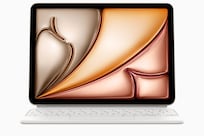SYDNEY // Qantas flights could to be back in the air as early as today, after an independent workplace tribunal ordered an end to industrial action that prompted an unprecedented grounding of the Australian carrier's entire global fleet.
In a late-night decision, Fair Work Australia ruled that strikes and overtime bans organised by three unions representing Qantas pilots, mechanics, baggage handlers and caterers over recent months had to stop. The Qantas chief executive, Alan Joyce, said the airline could resume a limited flight schedule this afternoon if the aviation regulator approved it.
Qantas flights were suspended worldwide on Saturday, stranding tens of thousands of passengers. The grounding was ordered by Mr Joyce in an effort to bring the long-running industrial dispute - over pay, conditions and plan to cut costs and jobs by setting up a new airline in a cheaper Asian hub - to a head.
The airline said it was losing A$15 million (Dh59 million) a week as a result of the strikes, which were forcing it to reduce or reschedule flights.
With nearly 70,000 people - including 17 Commonwealth leaders attending a summit in Perth - affected by the grounding by yesterday, the government took the rare step of ordering Fair Work Australia to convene an emergency meeting. The tribunal handed down its ruling after more than 14 hours of testimony from the government, the airline and unions in Melbourne.
The assistant treasurer, Bill Shorten, who had condemned Mr Joyce's decision to ground more than 100 aircraft in 22 countries as a "radical overreaction", welcomed the judgement. "We are pleased, after 24 hours of turmoil, common sense was restored," he said. "We believe now that Qantas and the unions will focus on getting flying as soon as they can."
The two sides in the dispute have been given 21 days to reach agreement or face binding arbitration. Fair Work Australia said it accepted that further industrial action would have caused significant economic harm.
The chairman of the Australian Council of Trade Unions, Jeff Lawrence, called on the government to ensure that Qantas management fulfilled its obligations. "We'll be working to make sure that those planes are in the air as soon as possible and that Qantas remains a good and viable airline," he said.
Commentators had warned that Qantas's move could damage the country's image internationally.
The "Flying Kangaroo", as the airline is known, was grounded at an embarrassing time for the government, which was hosting the biennial
Commonwealth Heads of Government Meeting. Seventeen world leaders attending the summit were booked to fly home on Qantas. The Prime Minister, Julia Gillard, said "they took it in good spirits when I briefed them about it", but she was plainly livid.
Today's edition of The Australian newspaper, published before the tribunal ruling, calls the grounding of the Qantas fleet "a devastating blow to Australia's image and international prestige". Warning that "this dispute fundamentally threatens the Qantas brand and the Australia brand", it recalls how once "iconic" companies such as Pan Am and Delta, and the American car maker General Motors, lost their lustre.
Earlier yesterday, Mr Joyce - facing an angry backlash from unions, passengers and the government - had defended his shock tactics. He said the unions had stepped up their threats following Qantas's annual general meeting on Friday, where shareholders voted to increase his pay package by 71 per cent, to A$5 million.
"Unfortunately, after the AGM the unions were more aggressive," he told the Australian Broadcasting Corporation. "They were talking about 48-hour stoppages, ramping her up, 'baking' us for a year … They said they were annoyed at the shareholders massively supporting Qantas … That was the threshold moment that changed everything."
There had been fears that Mr Joyce's move could disrupt federal parliament, which is due to reconvene tomorrow after a two-week recess. Politicians use Qantas for their official travel.
At Australian airports, 12 flights were at the gate and waiting to depart on Saturday when they were cancelled and passengers ordered to disembark. QF31 to London was actually taxiing down the runway at Sydney Airport when the pilot informed passengers: "There's a problem - don't worry, it's not mechanical. I'm very sorry to tell you this; in my career as a pilot I have never experienced this before."
At Los Angeles Airport, American tourists Douglas and Diane Phillips were buckled in and awaiting take-off to Melbourne when the pilot told them the flight had been grounded. "At first everyone thought they were kidding for some reason, but then we realised they were deadly serious," Mr Phillips told Associated Press.
Mark Durbin, a Londoner who was aboard QF31, was forced to sleep on the floor of the terminal with hundreds of other frustrated passengers. Qantas has been trying to rebook people with other airlines, but some faced days of delays.
foreign.desk@thenational.ae





